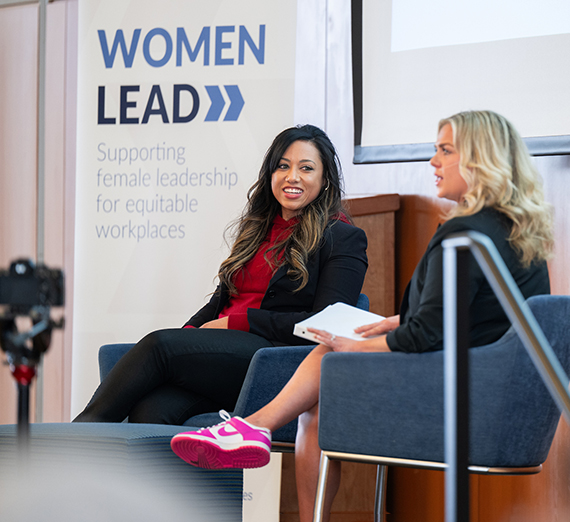Women Lead Turns 10: Just the Beginning

Ideas spark. Support grows. Collective intelligence thrives.
Sara Dean is describing the magic that happens when women with a growth mindset gather as a collective force.
During a workshop Dean (’98, ’26 M.A.) hosted at the 2025 Women Lead Conference called, “Speak Up, Stand Out: Advance Your Thought Leadership and Communication Confidence,” she witnessed the Hemmingson Ballroom come alive with energy as women and allies lifted each other up.
In 2015, Sherri Lynch (’96, ’04 M.A., ’22 Ph.D.) and Rachelle Strawther ('16 M.A., '20 Ed.D.) were asked by then-acting Dean Joe Albert to initiate a women’s leadership program housed within the School of Leadership Studies. A decade later, Strawther is leading Gonzaga’s Center for Lifelong Learning while Lynch is now assistant dean of the School of Leadership Studies. In that role, Lynch continues to cultivate a unique, infectiously powerful community through the annual Women Lead Conference, rooted in Gonzaga’s Jesuit mission, aimed at educating and empowering women professionally and personally.
First-time attendees become dedicated participants, conversation circles continue for years, and the demand for more programming never stops. Attendees leave the conference equipped with the confidence to seek promotions, negotiate higher salaries, and communicate with impact. This year’s conference agenda covered a multitude of topics: techniques in fostering a positive mindset, bringing your authentic self to work, engaging in courageous conversations to understand systemic racism, navigating self-care beyond capitalism, and more.

Avista employee and conference attendee Amy Jones says, “I love how empowered and inspired that I feel after this. I'm already thinking, I need to go home and reflect.”
“The quality of the environment provided here keeps me coming back. I like being around people who are in a growth mindset,” adds attendee Shanna Johnson.
But Women Lead is more than a conference. After the first few years, the programming quickly expanded to include workshops, an annual fall luncheon, book clubs, film screenings and conversation circles for community building. The momentum kept growing. By 2018, the Certificate in Women’s Leadership was created, open to all genders, to learn how to create more equitable and empowering workplaces.
Women Lead also challenges leadership norms by leaning into femininity in the workplace. “The more we can all lean into who we are authentically, the more we improve family dynamics, strengthen communities, and enhance our organizations,” Lynch says.
Leadership does not have to be authoritarian or fit a single mold. Take this year’s keynote speaker, Mandi Price (’14) for example. A leader among post-producers in Los Angeles who redefines leadership simply by showing up in comfortable clothes and her Air Jordans on set: “I am going to be there all day, so I might as well be comfortable!” says Price.

While gender-equity progress can be challenging to realistically assess, Women Lead uses workplace realities as fuel to uplift more women.
As Lynch notes, only 52 of the Fortune 500 companies in the United States are run by women, far from reflective of the country’s demographics. And the impacts of COVID-19 further exposed workplace disparities, with women losing jobs at higher rates than men and returning to the workforce more slowly. These setbacks exacerbated existing issues like the gender pay gap.
Rather than letting these disparities define the future, Women Lead is expanding its impact — on a global scale.
Women Lead is headed to Europe this April. Lynch is leading a Women Lead Conference in Florence, Italy, providing an international perspective on women in leadership and creating global learning opportunities and connections.
“Ten years in, it’s inspiring to see the impact of Women Lead and the Certificate in Women’s Leadership,” Strawther says.
So, what will the next 10 years entail? Lynch dreams big, potentially inviting speakers like Melinda Gates, Michelle Obama, and Chimamanda Ngozi Adichie to the conference. She dreams of creating a nationwide Women Lead tour, and exploring virtual or non-English programming for greater accessibility. However, Lynch also recognizes the importance of balancing expansion with maintaining the quality of content, conversation and impact.
"I want to leave the legacy of creating a community where people feel accepted, empowered, and capable of making a difference,” she reflects. “I’d like to think that I’m planting seeds I may never see grow — but knowing they are growing? That, to me, is really exciting."
